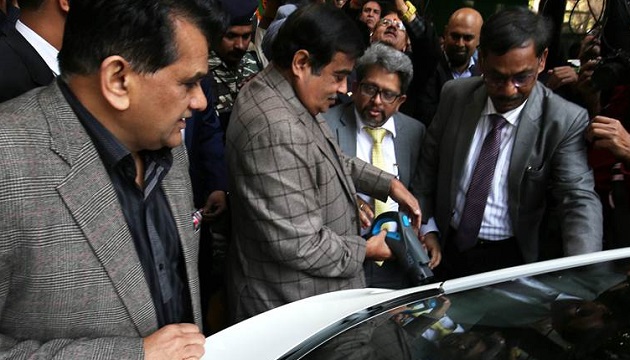Union Shipping and Transport Minister Nitin Gadkari on February 15, 2017, inaugurated Electronic Vehicle (EV) charging points at the Niti Aayog premises in New Delhi. In a bid to go green, the government is targeting the year 2030 by which it plans to go all-electric in terms of new car sales in the country. In its National Electric Mobility Mission Plan, the government hopes to get at least six to seven million electric vehicles on the road by 2020.
The event, “Charging the Drive,” was also attended by NITI Aayog CEO Amitabh Kant and members Ramesh Chand, Professor V K Saraswat and V K Paul.
So, what are EV charging points? As the name suggests, they are stations which will be set up in cities across the country to facilitate battery swapping charging for vehicles. NTPC Ltd, India’s largest power generation utility, has been tasked with setting up a blueprint for the project. Other energy public sector undertakings are also likely to be roped in to help build infrastructure. Government-owned Energy Efficiency Services Ltd, meanwhile, is incharge of inviting bids for bulk supply of electric and hybrid cars for central government ministries and public sector undertakings in Delhi.
Today, Gadkari inaugurated two charging points — fast and slow charging. Speaking at the inauguration, he said, “This is the beginning of a historical and revolutionary era. We spend Rs. seven lakh crores for importing crude oil in India, which is big trouble for India’s economy. It is important for our country to have import substitute which is cost-effective, pollution-free and indigenous.”
Urging manufacturers to enter the field and “reap the benefits of his burgeoning sector”, Gadkari added, “As we have inaugurated the electric charging stations and electric vehicles, the manufacturers are now in race of competition on large scale that who will bring it first.”
Gadkari said that 200 electric taxis are already on road in his Lok Sabha constituency, Nagpur district in Maharashtra. Interestingly, thanks to cab aggregator Ola, Nagpur is the first city in India which is equipped with battery swapping and charging stations. It was initiated by the company for a pilot project. There are only around 100 charging points installed across the country today.
“The price of these cars are also going to reduce soon. The manufacturer who brings the best quality at the lowest price will earn the most,” Gadkar said.
Kant, who also addressed the audience, said encouraging electric mobility has been a consistent stand of the NITI Aayog and setting up these charging stations is the first step.
India’s EV push comes in line with a global trend, following countries like Norway, the Netherlands and France who are working towards permitting only sales of EVs in the future.







